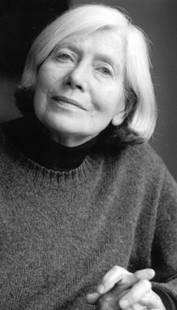|
 Nobel, Eithne Strong, 96pp Coiscéim 1998. Nobel, Eithne Strong, 96pp Coiscéim 1998.
by Tadhg Ó Dúshláine
Two qualities which Eithne Strong's poetry lack are conventional discretion and decorum. And thanks be to God for that. In her poem "Credo" (1980) she put her matter of fact literary concern succinctly: "an mianach pearsanta ábhar mo ghnó". And she stuck to it unapologetically: "I am interested in human beings and the business of living with people" (Sleeping with Monsters, Conversations with Scottish and Irish women poets). Not for her the cosy cabal of critical convention of arty-farty mutual admiration but the wholesome authority of experience: "You can't write at all if you haven't lived. I'm only interested in other people's writing insofar as it's got something to say about life. Cleverness alone is not enough". This is not arrogance, but fact and the tone of voice throughout is equally direct, as Pádraic Colum remarked on the publication of her Songs of Living in 1961: "the utterances of the priestess, the druidess, the sybil...her voice has the tone of one who lives outside companies." In a word, her work is magnanimous, full of heart and honesty as the name Eithne Strong suggests. This her final collection, Nobel, is both her summa and obituary that gives artistic expression to the fundamentals of the human condition: love, life and death.
The subtitle of the first section Grá ("Ní binnsceál i gcónaí é an grá") defines the theme: a celebration of all the relationships of spouse, family and humanity; and all their ups and downs, for better for worse. "Céile na mBlianta" is a deliberate, factual celebration of that love and the much misused word itself only appears by way of logical final conclusion as definition of this long fulfilling relationship: "...le fuarchúis/ aithním gurb é atá ann ná grá". The love and forgiveness that triumphs over sorrow and loneliness and depression, that cherishes and consoles always, rarely has it been celebrated with such simplicity and profundity as in:
Ba bhreá liom thar aon mo chéile ar ais beo,
bríomhar lem thaobh chun go nochtfainn dó
mo bhrón, an folús im lár, an t-uaigneas
am chloí ó bhásaigh sé,
is go maithfimis dá chéile chuile olc
a d'imríomar, duine ar dhuine, ansin
go mbaileoimis an maicín faoi mhíchumas
inár mbarróg is go seolfaimis i dteannta
go Dún na Saoirse, amach sa tsíoraíocht
pé ar domhan é.
Now awake at five a.m. on her daughter's birthday on the 19th of February 1998, despite the loss of her spouse that still pains her terribly, she is still full of the boundless energy of youth. Consistency, and the authenticity that goes with it, is the keynote here, from the young uncomprimising hedonist who would sow her wild oats in "Ainrian", to the bogger and proud of it despite the classy babes of TG4 of "Stuairí an Scáileáin, to the auld wan who could still teach the young buckos a thing or two in "Iolracht nach mbeidh".
For all that strength of feeling there is not the slightest hint of self-righteousness, but rather, an intuitive womanly devilment, as in the send up of official citations in the colloquial tone of cogar-mogar, from the opening ("Dheara...") to the closing ("Slán agat...") of the title poem "Nobel". I think I detect a distinct woman's voice too, throughout this collection, in the use of exclamation, intensification and the wide intonational range, together with a frankness about the intimacies of sex, motherhood, marriage failure, family quarrels, religion and death. The chat she would have with Mary about her relationship with Joseph is shockingly wonderful; the emotive spontaneity of the opening of the poem about her daughter (?) Sorcha ( "Dá bhfeicfeá an grianghraf de Shorcha...") is perfect; the unrestrained pride in the picture of her great grandson is super ("Samuel, Siombal" ); the grandmother's relationship with Jack, is as wonderful as life gets. Like Treasa of Avila she finds her muse among the pots and pans; not for her the sterile tuition of the bards, but family, chores like folding her son's pyjamas, form the stuff of her creativity.
But it's not all roses and Nobel is not all tongue in cheek, and her use of the word "blas"(taste) for the experience of life has that existentialist ring of the search for authenticity we first encounter in Irish poetry in the work of Seán ó Ríordáin.
No platitudes here, no pie in the sky when you die, but the grandmother's honest direct reply to the child's dramatic questioning about religion:
" Mhamó, céard iad na foinsí creidimh?
...Léigh, mar shampla, Primo Levi:
If This Is a Man, is 'na dhiaidh
The Truce dá chuid;
léigh An Evil Cradling
de chuid Brian Keenan-
tá tú in aois chucu siúd.
A Mhamó, bhfuil Dia gan locht?
Níl cur amach agam ar Dhia, a chroí
Níl ach
go mba bhreá liom
dul a chodladh...go buan...
buan...go deo...
a dhéagóirín liom i dtús do shaoil.
"Bíodh grá id chroí don uile ní" , the sixties catch-cry of "all you need is love", is the simple straightforward solution to the world's problems and injustices. And even if there is indignation in the social conscience that refers to the case of Ann Lovett, Eamonn Casey, and the political scandals in the ironically titled "Oileán na Naomh" and in the social satire of "Bláthanna an Tíogair", it never descends into angry despair: Eithne assures Éire that there is always hope ("Éire agus Eithne").
If great poetry is that which consoles us when facing the abyss, then this is it: a wonderful heroic defiance which takes the sting out of death itself. Maybe that is why her final words in this her final collection ring immortal: "Níl aon chruthú agam, tuigeann tú, / níl, ach gur aiséirigh mé". Cé tá marbh, maireann Eithne Strong.
|